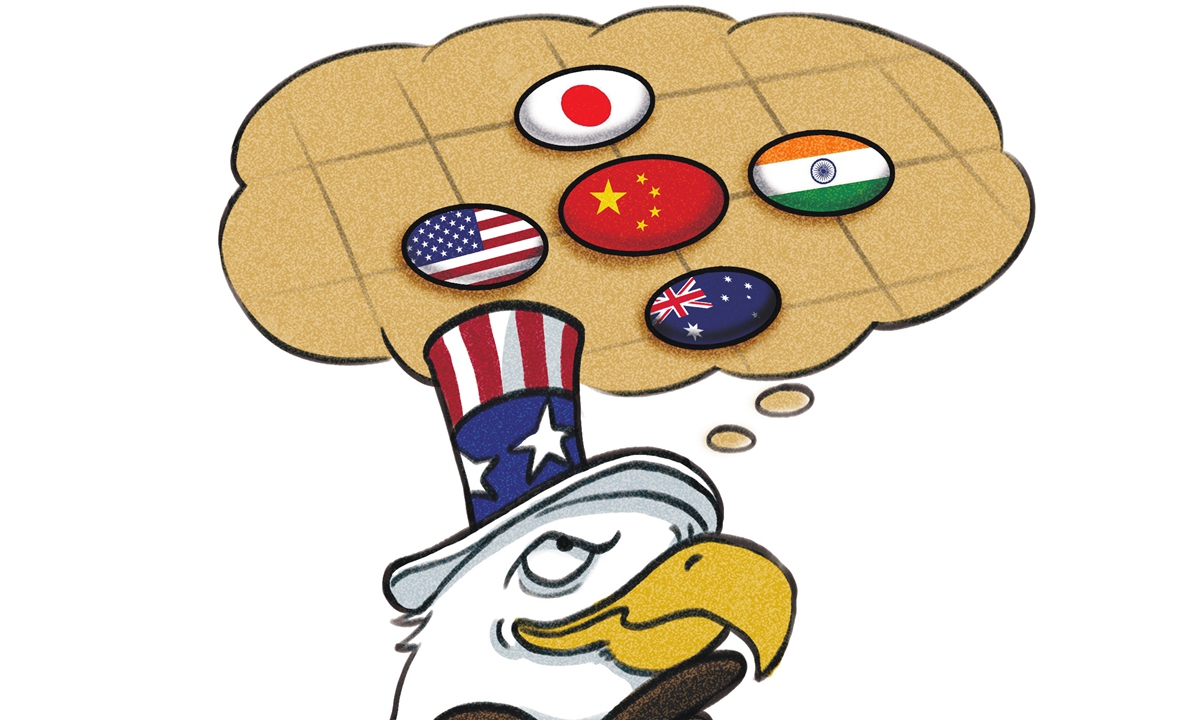All US' bark and no bite in Quad meeting
By Shen Yi Source: Global Times Published: 2020/10/6 21:25:24

Illustration: Liu Rui/GT
US Secretary of State Mike Pompeo held talks with his counterparts from Australia, India and Japan - so-called Quad (Quadrilateral Security Dialogue) countries, in Tokyo on Tuesday, with no joint statement issued after the meeting.
During the group's first in-person meeting since the COVID-19 outbreak, Pompeo said it was critical now for the US' regional allies in the Indo-Pacific region to counter the Communist Party of China's "exploitation, coercion and corruption in the South and East China seas, the Mekong, the Himalayas, and the Taiwan Straits."
Meanwhile, other Quad members have been cautious. After separate bilateral meetings with Pompeo on the sidelines of the Quad gathering, Australian and Japanese Foreign Ministers Marise Payne and Toshimitsu Motegi did not mention China in their speeches.
Such a result could be argued as predictable, as each of the Quad members is calculating their own separate interests.
The US, which has signed military alliance treaties with Japan and Australia, now wants to rope India in to boost not only the alliance and to gang up on China. However, such a goal is not easy to realize.
India is unlikely to take the US side. It has been buttering its bread on both sides of major power games ever since the Cold War. India is a country that tends to have higher confidence than its actual strength. Also, New Delhi wishes to become a superpower itself with strong nationalism in its public opinion. Therefore, it has no intent to dance to the US' tune.
Japan has been pursuing to become a normal state and a major power for a long time. Historically, it has been following greater powers in diplomacy. Yet Japan won't cling too tightly to Washington and will rather leave some room for adjustment of its policies. Moreover, both of Japan's goals, be it to become a normal state or seek major power status, need the support of China to be realized.
Take the Taiwan question. Japan is willing to endorse the US posturing verbally. But it has no interest to fight China in a real war for the Taiwan secessionist forces. For Japan, the South China Sea affairs and the Taiwan question are merely about its own southbound shipping lines, and China won't take any move to obstruct normal maritime navigation in the waters.
Australia seems to be a loyal follower of the US government. It wants to promote its own global status by promoting the Quad alliance. But how much strength does Australia own with its limited economy and population? Moreover, if Canberra is bent on infuriating China, Australia will only face the dire consequences.
The US is hoping to formalize the Quad into a NATO-like alliance, or "Asian NATO." To make it real is very difficult. NATO is a military alliance, and the first question the US will face is whether to encourage Japan to amend its pacifist constitution. Doing so would trigger huge uncertainties, even violent turbulence in the region. By not doing so, how could the US order Japan's Self-Defense Forces to carry out activities that go beyond Japan's constitution?
Australia could only offer little support in terms of military cooperation. India, on the other hand, would only create more challenges rather than help in terms of formalizing a military alliance with any country, as its weapons are created and bought from different countries. If the US wants to count India in its "Asian NATO," it would need to persuade India to give up its Russia-made weapons and substantially invest to change the standards of Indian firearms to the standards of the US. Substantial amounts of money and work will also be needed to create a modern Indian command system.
Japan and Australia seem to face lesser obstacles in the above-mentioned technical field. Yet, they are strange bedfellows. White supremacy in Australia is most notable among Western countries. Deep down in Australians' hearts, they tend to look down on all other races. Would Japan simply bear it?
More importantly, the Quad or "Asian NATO," the key to formalizing a new alliance depends on the US' own capacity. However, the weirdness of this issue is that if the US is strong enough, it does not need a new alliance at all. The fact that the US dreams of it only proves its declining ability. To unite its allies, the US would need to offer some interests, yet it has almost nothing to offer now. Common values are not enough to make others take the side of the US.
Against the backdrop of the COVID-19 health crisis, Japan, Australia and India have shown enough support to the US by participating in the Quad meeting. As Chinese Ambassador to the US Cui Tiankai said, China does not seek global dominance. As long as China follows its path, the punches the US throws will hardly hurt China.
In today's world, any move to create a military, political and exclusive alliance aimed at countering China, one of the most significant forces in promoting globalization, is a pseudo-proposition that goes against the times. Such a strategy is bound to fail.
After Donald Trump tested positive for the coronavirus, Japan was not among the first countries to send well wishes, which shows Tokyo wants to keep some distance from the US. If Japan, one of US' closest allies, has such a mindset, how would other countries think about their ties with Washington?
The US has been barking aloud before and during the Quad meeting. But will it bite with expected "unity" from the Quad? The answer is no. At least, the result of this Quad meeting is evidence of the US' relatively declining leadership.
The author is professor at the School of International Relations and Public Affairs of Fudan University. opinion@globaltimes.com.cn
RELATED ARTICLES:
Posted in: VIEWPOINT